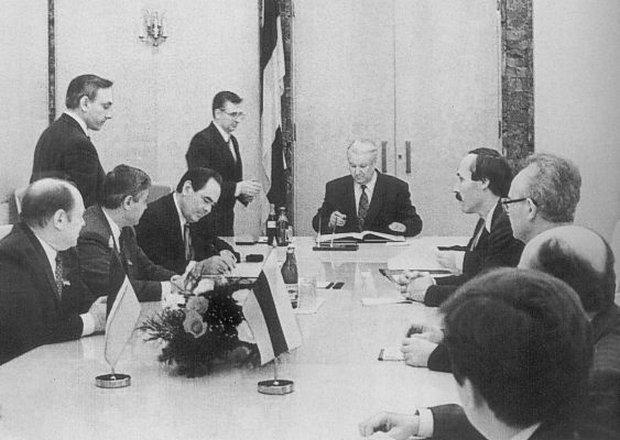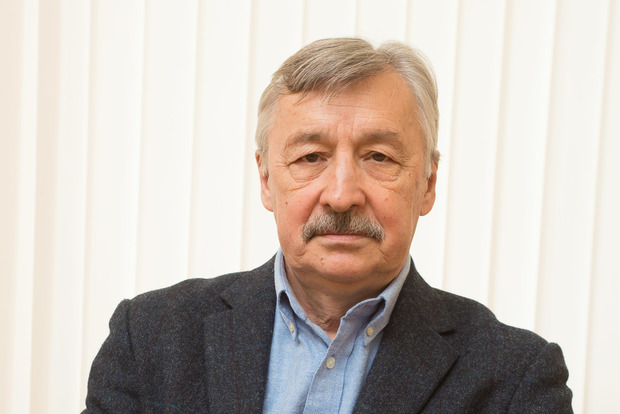Rafael Khakimov: ‘Someone didn’t like that we wanted to agree with Moscow, not just to obey’
What are the consequences of people's decision on the sovereignty of Tatarstan adopted by the referendum in 1992
On 21 March 1992, 24 years ago, Tatarstan hold a referendum when residents of the Republic were asked only one question: 'Do you agree that Tatarstan is a sovereign state, a subject of international law, building its relations with the Russian Federation and other republics, states on the basis of equal treaties?' The majority of the voters confirmed this thesis. What are the results of this referendum and whether it is possible to hold such referendum today — the director of the Institute of History named after Mardzhani of the Academy of Sciences of RT Rafael Khakimov told Realnoe Vremya.
'Legitimacy needed to be confirmed'
Rafael Sibgatovich [Khakimov – editor's note], exactly 24 years ago, on 21 March 1992 Tatarstan hold the referendum on the sovereignty of the Republic. What were the aims of Mintimer Shaimiev by organizing this referendum?
First, it was necessary to make sure that it was legitimate. It was said in Moscow that communist nomenklatura remained in Kazan, who opposed democracy, the people do not support and so on. They [Moscow – editor's note] thought the Russians would oppose it. This legitimacy needed to be confirmed. We announced our status in the Declaration and wanted to secure it in the Constitution and in the treaty. It needed to be confirmed by the opinion of all population, which gave us the opportunity during the negotiation process to include in the contract those positions that we needed.
There were two main problems. The first was the issue of two equal state languages. The second one – relations with Moscow should be based on the contract, we specified it in the Declaration.
Nevertheless, a third of the population were against. What did they want to gain by this decision?
Someone feared that it was full independence. Because at that time the CIS was established. Someone didn't like that we wanted to agree with Moscow, not just to obey. Liberals are liberals, but democrats were for what Moscow would say, and to do that way. Someone just couldn't decide.

'Bulldoze' from the centre
Rafael Sibgatovich, why was the contract on the differentiation of powers between Tatarstan and the federal center signed only two years after the referendum? Why did they do it much time later?
The reasons were different. Domestic elites had some problems. Burbulis was 'bulldozed', they reminded him Tatarstan as well. The referendum was said to be a kind of sociological survey, a partial proof that the people vote for it. In general, as it always happens in politics: you do not want to admit that you couldn't hold your point of view. In 1992, there was a terrible 'bulldoze': at the prosecutor's office, at military departments, also there was the pressure at the legislative level, and just from the press. It, probably, doesn't need to be told.
How has Tatarstan managed to avoid the Chechen scenario?
When the Declaration was being drafted, there was a commission. We were looking for common coordinated approaches. We were not imposed some point of view, different opinions were taken into account. Besides, there was a lot of explanatory work. We did everything openly. We have been negotiating with Moscow at different political levels: two governments, ministries. That's why we had many allies in Moscow who understood that we agreed to live together, not to fight. Therefore, the technique and approach of the negotiation process worked well here.
Was it the only such referendum among the regions in Russia?
Yes, the only one. All the others only played in the sovereignty.
What is the reason that other republics, for example neighboring Bashkortostan, did not do the same?
They had their own problems. In Bashkortostan there was absolutely opportunistic approach. Yakutia was more advanced in this respect. And Caucasus went a completely different way.

'First of all, we got what is the basis of our stability and peace — the recognition of two equal languages. In general, it symbolizes the recognition of Tatar culture in Russia. Secondly, we have the right to determine our own economic policy.' Photo: Maksim Platonov
The profit of the referendum
What are the advantages that Tatarstan has received (and receives) today from the referendum and from the Treaty on the division of powers?
First of all, we got what is the basis of our stability and peace — the recognition of two equal languages. In general, it symbolizes the recognition of Tatar culture in Russia. Secondly, we have the right to determine our own economic policy that has given the result today. We invested money where we wanted and what we believed to be right. We have developed infrastructure, held privatization differently, engaged in gasification, eliminated light housing at the expense of introducing our own tax. There was an agreement on the easing of taxes to the federal budget. That time this tax was 22-25%. And today, officially, 73%, unofficially — more, but we will focus on the official figures. We have invested the differencein cleaning up an oil zone from spoiling nature, in the roads, phones, Internet – all that gave us an effect today, without which the market does not work. Current achievements are the result of those days.
Is it possible to hold such referendum in Russia today?
No, it is impossible. Such laws had been adopted. Democracy is democracy, but it is as Moscow say it to be.